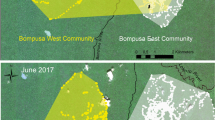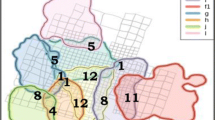Abstract
Several studies have shown that affiliative contact between opponents increases after conflicts in a number of primate species. This study investigated the effect of inter-opponent distance on the occurence of reconciliation in stumptail and rhesus macaques. Both species were represented by multi-male, multi-female groups housed in large outdoor compounds. Ten-minute focal animal observations during post-conflict (PC) and matched control (MC) samples were collected in which affiliative interactions and the inter-opponent distance at the beginning of each sample were recorded. A total of 251 and 561 PC-MC opponent pairs were obtained for stumptail and rhesus macaques, respectively. Inter-opponent distance was smaller in PC than in MC observations for both stumptail and rhesus macaques. Conciliatory tendency varied as a function of the initial PC-MC inter-opponent distance. In particular, the closer opponents were in PC compared to MC periods, the more likely they were to reconcile. When the inter-opponent distance was the same in PC and MC periods the conciliatory tendency of both species was notably reduced. These findings have implications for the estimation of conciliatory tendency and its use in comparative studies.
Similar content being viewed by others
References
Altmann, J. 1974. Observational study of behavior: sampling methods.Behaviour, 49: 227–266.
Aljreli, F. 1992. Post-conflict behaviour among wild long-tailed macaques (Macaca fascicularis).Behav. Ecol. Sociobiol., 31: 329–337.
Aljreli, F.;Das, M.;Veenema, H. C. 1997. Differential kinship effect on reconciliation in three species of macques (Macaca fascicularis, M. fuscata, andM. sylvanus).J. Comp. Psychol., 111: 91–99.
Butovskaya, M. 1993. Kinship and different dominance styles in groups of three species of the Genus Macaca (M. arctoides, M. mulatta, andM. fascicularis).Folia Primatol., 60: 210–224.
Call, J.;Judge, P. G.;de Waal, F. B. M. 1996. Influence of kinship and spatial density on reconciliation and grooming in rhesus monkeys.Amer. J. Primatol. 39: 35–45.
Castles, D. L.;Aureli, F.;de Waal, F. B. M. 1996. Variation in conciliatory tendency and relationship quality across groups of pigtail macaques.Anim. Behav. 52: 389–403.
de Waal, F. B. M. 1989. Dominance ‘style’ and primate social organization. In:Comparative Socioecology,Standen,V.;Foley,R. (eds.), Blackwell, Oxford, pp. 243–263.
de Waal, F. B. M. 1993. Reconciliation among primates: a review of empirical evidence and unresolved issues. In:Primate Social Conflict,Mason,W. A.;Mendoza,S. P. (eds.) SUNY Press, Albany, pp. 111–144.
de Waal, F. B. M.;Ren, R. 1988. Comparison of the reconciliation behavior of stumptail and rhesus macaques.Ethology, 78: 129–142.
de Waal, F. B. M.;Yoshihara, D. 1983. Reconciliation and redirected affection in rhesus monkeys.Behaviour, 85: 224–241.
Kappeler, P. M.;van Schaik, C. P. 1992. Methodological and evolutionary aspects of reconciliation among primates.Ethology, 92: 51–69.
Petit, O.;Abegg, C.;Thierry, B. 1997. A comparative study of aggression and conciliation in three cercopithecine monkeys (Macaca fuscata, Macaca nigra, andPapio papio)Behaviour, 134: 415–432.
Petit, O.;Thierry, B. 1994a Aggressive and peaceful interventions in conflicts in Tonkean macaques.Anim. Behav., 48: 1427–1436.
Petit, O.;Thierry, B. 1994b. Reconciliation in a group of black macaques (Macaca nigra).J. Wildlife Preservation Trust, 30: 89–95.
Silk, J. B. 1997. The function of peaceful post-conflict contacts among primates.Primates, 8: 265–279.
Silk, J. B.;Cheney, D. L.;Seyfarth, R. M. 1996. The form and function of post-conflict interactions between female baboons.Anim. Behav. 52: 259–268.
Swedell, L. 1997. Patterns of reconciliation among captive gelada baboons (Theropithecus gelada): a brief report.Primates, 38: 325–330.
Thierry, B. 1986. A comparative study of aggression and response to aggression in three species of macaque. In:Primate Ontogeny, Cognition and Social Behavior,Else,J. G.;Lee,P. C. (eds.), CambridgeUniv. Press, Cambridge, pp. 307–313.
Eenema, H. C.;Das, M.;Aureli, F. 1994. Methodological improvements for the study of reconciliation.Behav. Proces., 31: 29–38.
York, A. D.;Rowell, T. E. 1988. Reconciliation following aggression in patas monkeysErythrocebus patas.Anim. Behav., 36: 502–509.
Author information
Authors and Affiliations
About this article
Cite this article
Call, J. The effect of inter-opponent distance on the occurrence of reconciliation in stumptail (Macaca arctoides) and rhesus macaques (Macaca mulatta). Primates 40, 515–523 (1999). https://doi.org/10.1007/BF02557587
Received:
Accepted:
Issue Date:
DOI: https://doi.org/10.1007/BF02557587




